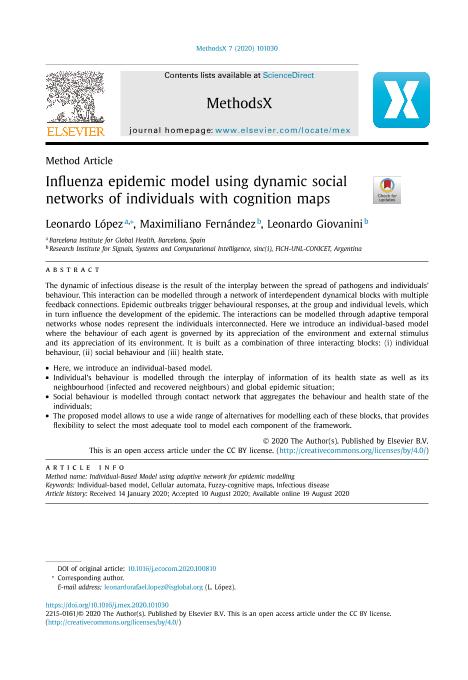Mostrar el registro sencillo del ítem
dc.contributor.author
López, Leonardo
dc.contributor.author
Fernández, Maximiliano Andrés

dc.contributor.author
Giovanini, Leonardo Luis

dc.date.available
2023-01-23T16:33:43Z
dc.date.issued
2020-01
dc.identifier.citation
López, Leonardo; Fernández, Maximiliano Andrés; Giovanini, Leonardo Luis; Influenza epidemic model using dynamic social networks of individuals with cognition maps; Elsevier; MethodsX; 7; 1-2020; 1-14
dc.identifier.uri
http://hdl.handle.net/11336/185298
dc.description.abstract
The dynamic of infectious disease is the result of the interplay between the spread of pathogens and individuals’ behaviour. This interaction can be modelled through a network of interdependent dynamical blocks with multiple feedback connections. Epidemic outbreaks trigger behavioural responses, at the group and individual levels, which in turn influence the development of the epidemic. The interactions can be modelled through adaptive temporal networks whose nodes represent the individuals interconnected. Here we introduce an individual-based model where the behaviour of each agent is governed by its appreciation of the environment and external stimulus and its appreciation of its environment. It is built as a combination of three interacting blocks: (i) individual behaviour, (ii) social behaviour and (iii) health state. • Here, we introduce an individual-based model. • Individual's behaviour is modelled through the interplay of information of its health state as well as its neighbourhood (infected and recovered neighbours) and global epidemic situation; • Social behaviour is modelled through contact network that aggregates the behaviour and health state of the individuals; • The proposed model allows to use a wide range of alternatives for modelling each of these blocks, that provides flexibility to select the most adequate tool to model each component of the framework.
dc.format
application/pdf
dc.language.iso
eng
dc.publisher
Elsevier

dc.rights
info:eu-repo/semantics/openAccess
dc.rights.uri
https://creativecommons.org/licenses/by/2.5/ar/
dc.subject
CELLULAR AUTOMATA
dc.subject
FUZZY-COGNITIVE MAPS
dc.subject
INDIVIDUAL-BASED MODEL
dc.subject
INDIVIDUAL-BASED MODEL USING ADAPTIVE NETWORK FOR EPIDEMIC MODELLING
dc.subject
INFECTIOUS DISEASE
dc.subject.classification
Otras Ciencias de la Computación e Información

dc.subject.classification
Ciencias de la Computación e Información

dc.subject.classification
CIENCIAS NATURALES Y EXACTAS

dc.title
Influenza epidemic model using dynamic social networks of individuals with cognition maps
dc.type
info:eu-repo/semantics/article
dc.type
info:ar-repo/semantics/artículo
dc.type
info:eu-repo/semantics/publishedVersion
dc.date.updated
2023-01-23T00:35:30Z
dc.identifier.eissn
2215-0161
dc.journal.volume
7
dc.journal.pagination
1-14
dc.journal.pais
Países Bajos

dc.journal.ciudad
Amsterdam
dc.description.fil
Fil: López, Leonardo. Instituto de Salud Global de Barcelona; España
dc.description.fil
Fil: Fernández, Maximiliano Andrés. Consejo Nacional de Investigaciones Científicas y Técnicas. Centro Científico Tecnológico Conicet - Santa Fe. Instituto de Investigación en Señales, Sistemas e Inteligencia Computacional. Universidad Nacional del Litoral. Facultad de Ingeniería y Ciencias Hídricas. Instituto de Investigación en Señales, Sistemas e Inteligencia Computacional; Argentina
dc.description.fil
Fil: Giovanini, Leonardo Luis. Consejo Nacional de Investigaciones Científicas y Técnicas. Centro Científico Tecnológico Conicet - Santa Fe. Instituto de Investigación en Señales, Sistemas e Inteligencia Computacional. Universidad Nacional del Litoral. Facultad de Ingeniería y Ciencias Hídricas. Instituto de Investigación en Señales, Sistemas e Inteligencia Computacional; Argentina
dc.journal.title
MethodsX
dc.relation.alternativeid
info:eu-repo/semantics/altIdentifier/url/https://linkinghub.elsevier.com/retrieve/pii/S2215016120302508
dc.relation.alternativeid
info:eu-repo/semantics/altIdentifier/doi/http://dx.doi.org/10.1016/j.mex.2020.101030
Archivos asociados
